
It is that time of the year when everybody has those sweet cravings. Have you ever wondered how that key ingredient (sugar or jaggery) of your favorite dessert is made and what is the journey it takes before it ends up on your plate/cup? Well, read on if you wish to know about it.
Mandya, located on the fertile plains of the Cauvery river in South-Interior Karnataka is known as the sugar city of Karnataka. It’s countryside is surrounded by sugarcane fields and the sweet smell of molasses wafts in the air. The tropical weather, the fertile plains and the abundant water in its various irrigation canals ensures that they have multiple harvests every year. As a thumb rule, farmers setup traditional sugarcane factories to process the harvest. If the farmer doesn’t have such sugarcane factories, they send their produce to the larger sugar factory, which can also be seen around sugar growing hotspots. This article and the photographs here show the inside workings of one such traditional sugarcane factory.
This sugarcane factory was a flat open area surrounded by sugarcane fields. It consisted of a brick structure, with two floors. On the top floor is a diesel powered engine, a sugarcane crusher, a chimney setup and the sugarcane. And on the ground floor is the filtration, boiling and sieving system. Sugarcane workers from Uttar Pradesh are usually the ones to be seen in such factories. Either, they come cheap or they are extremely skilled.
Tractor loads of sugarcane arrive at these factories upon harvest. This sugar cane is then sent up to the first floor via the lift (operated by the diesel engine or electricity). On the first floor, this sugarcane then goes into the sugarcane crusher to remove all its juice. The juice flows via a pipeline to the ground floor while the mulch is thrown out into a separate enclosure. I am not sure if they convert this mulch into fertilizer or if they give it to sugar factories to make ethanol.
In the ground floor, there are 3 inter connected pits. The sugarcane flows into the first pit where it is cleaned, striired and filtered. In the second one, it is allowed to boil and it is continuously stirred. In the third one, it is further cleaned and allowed to cool. Lying perpendicular to the third pit is a slope followed by a wide enclosure where the molten jaggery is poured and allowed to air dry. At this enclosure, either the jaggery is cut into different sizes when it is cold or it is stored into different containers when it is in molten condition. The dry jaggery is now ready for consumption and distribution.
In a full blown sugar factory, the whole thing is automated. And in addition to making jaggery, they crystallize it to make sugar and then they make ethanol and other chemicals from the molasses as by products. They also do produce some electricity too.
One can easily walk into such traditional sugarcane factories, talk to the workers, take permission from them and watch them go about their entire work. If you happen to get lucky like how we got, you can also learn about the entire process while sipping on some fresh sugarcane juice. The next time, you smell molasses in the air while crossing sugarcane fields, do keep an eye out for such traditional sugarcane factories. May be, you too will get to experience it first-hand and up close.
Travel blog of an Indian traveler living his dream of experiencing the world and inspiring others to live their travel dream. Focus areas are travel and visa tips, destination guides, experiential travel stories and traveling as a vegetarian.
Friday, October 30, 2020
The Sweet Journey: From inside a sugarcane factory near Mandya
Wednesday, October 28, 2020
Mirjan Fort: The 16th century structure that is taken over by moss during the monsoons

It was an important trading center for pepper, cassia and nutmeg between the 16th and the 19th century. It has stood the test of time in spite of countless battles. While there are many theories regarding its exact history, it is clear that it has seen the rule of Vijayanagara kings, Bijapur sultans, Keladi kings, the Marathas and the British. I am talking about the laterite rock structure called Mirjan Fort that is located by the banks of the Aghanashini river between Kumta and Gokarna in the Uttara Kannada region of Karnataka.
While this 16th century monument enjoys a rich past, I like it for its vibrant green colour that it dons during the monsoon season. The high humidity, the bright sunshine and the consistent heavy showers ensures that moss takes over this reddish brown laterite rock structure and turns it into a green paradise that is surrounded by even more greenery. The swaying coconut palms, the tropical forests and the Western Ghats in the background complete this magical green concoction.
In its hey days, Mirjan fort enjoyed a protective circular moat, high turrets on its bastions, secret passages, darbar halls, markets, water management, prayer halls, watch towers and more. Today, the structure stands tall in all its glory minus the internal structures and allows nature to decorate it the way it pleases. This decoration by mother nature is very pleasing to the eye and is the main reason for you to visit Mirjan fort in the monsoons and may be right after.
History lovers and archaeology students might see way more details in this historical structure, but to the eye of the regular visitor, it is this green world that completely mesmerizes them. I highly recommend visiting this historical gem in the monsoons.
Best season to visit:
The monsoons and the post winter months are best to see the Mirjan fort decked completely in green. They also happen to have the most pleasant weather.
One can also visit in the spring and summer months, but mostly in the cooler times of the morning and late evening. High humidity might be an issue in this season.
How to reach here:
The nearest railway station would be Kumta. The nearest airport would either be Hubli in Karnataka or Panjim in Goa.
Mirajn Fort is about 12 kms north of Kumta and 21 kms south of Gokarna. Buses playing between Kumta and Gokarna or Karwar will drop you on the NH 66 highway point that leads to the Mirjan Fort. From this point, it should be a 5 to 10 minute walk on flat land.
Where to stay:
If beach resorts are on your mind, the beach cottages at Gokarna would be your best bet. South Goa and Maravanthe beach, though a bit far away would also be good choices.
If forest stays are on your mind, you should try the homestays located in the Sirsi – Yellapur region. My favorite is the Tavarumane homestay that is located near Jajjigudde village.
If good quality budget accommodation is on your mind, try the hotels at Kumta, Sirsi or Honavara.
If luxury accommodation is what you crave, try the ones at Kundapura, Goa, Hubli, Udupi or Mangalore.
Where to eat:
The nearest place to eat would be either Kumta or Gokarna. While Gokarna might have more beach facing restaurants, Kumta has slightly larger restaurants.
If you prefer to stick to the highway, there are various highway restaurants catering to different needs of their visitors.
Other nearby tourist attractions:
1) Gokarna: The coastal town known for its temples and pristine beaches
2) Karwar: The town on the Karnataka-Goa border known for its offshore islands, black sandy beaches and Kali river estuary
3) Apsarakonda Falls: A gorgeous waterfall located real close to the Arabian Sea
4) Sharavati river valley: The view of Shola forests surrounding the Linganamkki reservoir on the Sagara – Honavara highway
5) Jog Falls: One of the highest waterfalls of India and an iconic landmark of Karnataka
6) Yana rocks and caves: A magical place in the forests of Karnataka
7) Vibhooti Falls: Karnataka’s jungle waterfall with a natural swimming pool
8) Unchalli Falls: Stunning monsoon holiday destination of Karnataka
9) Magod Falls: One of the most magnificent waterfalls of Karnataka
10) Sathodi Falls: Karnataka’s prettiest jungle waterfall
11) Bilihole Falls: Hidden waterfall amidst the untouched forests of the Western Ghats in Karnataka
12) Sirsi Marikamba Temple: A 16th century temple dedicated to goddess Durga and that is an iconic landmark of Uttara Kannada
13) Maravanthe Beach: The highway rider’s favorite pitstop
Sunday, October 25, 2020
Magod Falls: A Colossal Monsoon Spectacle
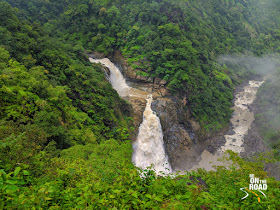
It is one of the most magnificent waterfalls of Karnataka that becomes a thundering spectacle of water tumbling down in torrents amidst pristine forests of the Western Ghats. Add to it the persistent drizzle and/or rains, consistent mist cover, fresh green vegetation and you have a dream monsoon holiday destination. 
Somewhere between Sirsi and Yellapur and surrounded by the dense forests of the Western Ghats, the Bedti river takes 3 turns and drops close to 660 feet in 2 steps to form the mighty Magod falls. The Magod falls view point is located on the opposite hill and this allows you to see the entire spectacle from different view points across different elevations. The walk between these various view points is an experience in itself as during the rains this entire trail is covered in mist and one must patiently wait for the mist to clear so that they can see the waterfall view that they could hear all along.
Each view point (there are 4 or 5 in total) allows you to enjoy the Magod waterfall from different vantage points. The walk between the view points is short, but steep and hence each view point allows you to catch your breath while you soak in the lush views. In between these view points on the opposite side of hill are some other tiny waterfalls that come alive during the monsoons and make for an interesting view too.
If you don’t mind the rains, this terrain allows you the best experience of the forests, mist, clouds, waterfalls and a monsoon walk. It is also a perfect place for a monsoon lunch, but do keep an eye out for the rowdy monkeys here. If you love monsoon holidays, this colossal monsoon spectacle should certainly feature high on your monsoon travel bucket-list in Karnataka. One of the top gems of Uttara Kannada and one of my favorite waterfalls of Karnataka.
Best season to visit:
The monsoons are the best time to see the waterfall in full flow. This is also the time when the surrounding vegetation is lush and the waterfall carries heavy volumes of water. At times, mist can cover the waterfall view during the monsoons. It is best to wait for a few minutes to allow the mist to clear.
The post monsoon season is also a great time to see the waterfall. Views are much clearer during this time and there is no threat of rain or leeches.
How to reach there:
Magod Falls lies right in between Sirsi and Yellapur.
There are two routes to reach to this waterfall:
Route 1: This is the main route with larger roads. You reach Yellapur and from Yellapur take the main road towards Kavadikere and Magod Falls.
Route 2: This is a tougher, but prettier route. It takes you through dense forests and the roads are much smaller here. At places, there might nothing more than a mud track here. When coming from Sirsi and once you cross the Bedti river bridge, you keep a look out for a left turn near Upaleshwara. This left turn will take you to Ghante Ganapati temple and from there to Chandaguli village and then onto Magod Falls.
Where to stay:
If budget accommodation is on your mind, you can try the budget hotels in either Sirsi or at Yellapur.
If you prefer a traditional experience, I would recommend staying at homestays in this region. My favorite homestay in this region is Tavarumane homestay, a simple place near Jajjigudde village that is surrounded by nature and that comes with unbelievably delicious food.
If beach resorts are on your mind, try the ones in and around Kumta, Gokarna or Karwar.
Where to eat:
The nearest place to eat would be Yellapur.
Shanbag hotel is a famous hotel for vegetarians. They also specialize in ayurvedic products of the land.
Indraprastha restaurant is also a great place to eat good food.
There are other restaurants on the main road to cater to the diverse dietary needs of the people.
Other nearby tourist attractions:
1) Sathodi Falls: Karnataka’s prettiest jungle waterfall
2) Shivapura hanging bridge: A motorcyclist’s delight on the Kodisalli reservoir
3) Yana rocks and caves: Magical place in the forests of Karnataka
4) Kavadikere: Lake temple dedicated to goddess Durga between Magod falls and Yellapur
5) Shirley Falls: A pristine forest waterfall near Yellapur
6) Vibhooti Falls: Karnataka’s jungle waterfall with a swimming pool
7) Unchalli Falls: Stunning monsoon holiday destination of Karnataka
8) Devimane Ghat: Monsoon beauty home to medicinal plants and herbs
9) Jog Falls: One of the highest waterfalls of India and an iconic landmark of Karnataka
10) Mirjan Fort: A 16th century fort located between Kumta and Gokarna
11) Dandeli: A pretty little village known for its diverse tribes, hornbills, wildlife and adventure sports
12) Gokarna: A coastal town known for its temples and gorgeous beaches
13) Karwar: Quiet little fishing town on the Karnataka-Goa border known for its black sandy beaches, Kali river estuary and offshore islands
14) Bilihole Falls: A hidden waterfall located amidst the untouched forests of Western Ghats in Karnataka
15) Sirsi Marikamba temple: A 17th century temple dedicated to goddess Durga and an iconic landmark in the Uttara Kannada region of Karnataka
Friday, October 23, 2020
Devimane Ghat: Monsoon Beauty home to Medicinal Plants and Herbs
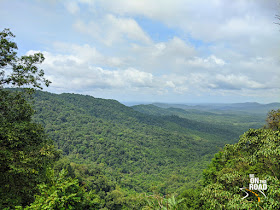
It gets close to 6000 mm of rain every year. It is home to a pristine ecosystem consisting of tropical rainforests, tropical evergreen forests, medicinal plants, medicinal herbs, reptiles, mammals, birds of paradise and many waterfalls, streams and rivers. It is a hill station and a lesser known monsoon giant. I am talking about the Devimane Ghat in Uttara Kannada that falls on the Sirsi-Kumta highway of Karnataka.
A elephant hundi with an upswept trunk (donation box) catches your attention along with miles and miles of lush green and rows of mountain ranges. This is the location of the Durga Devi temple and the Devimane ghat view point. From here, the road dips and curves towards Kumta and the rest of the Karavali coast. Hence, people stop here, seek the blessings of the goddess, offer their donations to the elephant, enjoy a hot cup of tea or coffee while enjoying the lovely view and continue their way down the ghats towards Kumta or up towards Sirsi. But, there is so much more to Devimane that people miss out on.
In between these 15 hairpin curves of the Devimane Ghat lies the Devimane village, a yawning little town that connecting to a elephant corridor, a wildlife sanctuary and lush forest area where many naturally growing medicinal herbs and plants are found. And if you go further into the forest, you come to the Benne hole waterfalls, a milky white cascade in the middle of pristine nature. This belt is perfect trekking terrain, especially for nature lovers. Lion tailed macaques, langurs, gaurs, elephants, birds of paradise, butterflies, king cobras and many other exotic wild species have been spotted here.
During the monsoons, Devimane receives copious rainfall and is more or less covered in mist throughout. During the summer months, owing to its proximity to the coast and high humidity, it happens to be one of the coolest places in the state of Karnataka. 
It doesn’t matter whether you are a student of botany, a nature lover, a trekker, a wildlife enthusiast or a student of Ayurveda, you are bound to fall in love with the charms of Devimane. It’s lush jungles, the mighty Sahyadris and the rich bio-diversity of the Western Ghats are a treat to the senses and need to preserved by us for many generations to come. They are the lifeline of the Southern peninsula. A highly recommended place for the experience, but do remember to leave the place exactly as you find it.
Other nearby tourist attractions:
1) Unchalli Falls – stunning monsoon holiday destination of Karnataka
2) Mirjan Fort – 16th century fort that gets enveloped by moss during the monsoons
3) Yana rocks and caves – magical place in the forests of Karnataka
4) Vibhooti Falls – Karnataka’s jungle waterfall with a natural swimming pool
5) Sirsi Maarikamba temple – 17th century temple dedicated to goddess Durga
6) Magod Falls – one of the most magnificent waterfalls of Karnataka
7) Shivagange Falls – a 74 m high waterfall on the Sonda river
8) Bilihole Falls – hidden waterfall amidst the untouched forests of the Western Ghats of Karnataka
9) Jog Falls – one of the tallest waterfalls of India and an iconic landmark of Karnataka
10) Coastal town of Gokarna – it is known for its temples and pristine beaches
11) Karwar – it is known for its black sandy beaches, Kali river estuary and beautiful offshore islands
Wednesday, October 21, 2020
Traveling Eastern Europe
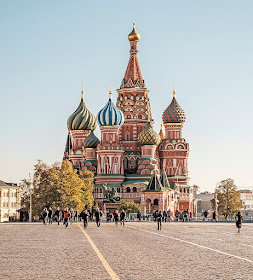
Eastern Europe and the Baltics are places left undiscovered to many travellers. The lands of the former Soviet Union and Eastern Bloc were, for many years, difficult to access for many tourists. Even if you were permitted entry, you were likely to be watched strictly by government assigned tour guides. Those days, however, are long gone. Today thousands of people visit these fascinating countries every year. Look below for some tips on the major cities of this fascinating part of the world.
Moscow
Perhaps more than any other city in the region, Moscow is a place that inspires awe in the hearts and minds of people around the world. Once the centre of the Muscovite aristocracy, then the centre point of the Russian Empire, and latterly the capital of global communism, Moscow is a truly fascinating place. Like many metropolises, Moscow can cause shock and wonder in equal measure.
A note for when you are travelling to parts of the world that you are unfamiliar with, such as Russia: money transfer services can be a little hard to understand when in Eastern Europe, so it’s best to visit a money transfer site like www.exiap.com/guides/money-transfer-services before you set off. This will ensure you have a back up plan if you do find yourself in a sticky situation with your finances when you travel.
Tallinn 
This Baltic city is a real gem. The Estonians are proud of their national identity and consider the rule of the USSR an illegal occupation. Therefore, it is not strictly speaking correct to describe the country as a one time member state of the Soviet Union. The fierce independence of the Estonians is clear in the unique architecture of their maritime capital. St Olaf’s Cathedral is believed to have been the tallest building in the world in the 16th century and it still stands imperious over the city today. The historic old town centre is another enjoyable architectural wonder.
St Petersburg
The next city on our list is another Russian marvel. St Petersburg has long been considered the “cultural capital” of the Russian Federation, and it’s clear to see why - the city’s thriving arts scene rivals those around the world. The city is replete with historical splendor as well. A trip to the Hermitage museum (the 2nd largest museum in the world) will leave any traveler truly amazed. The Winter Palace, part of the Hermitage and home of Russian emperors for almost 300 years, is an incredible example of grandiose, aristocratic European design.
Tbilisi 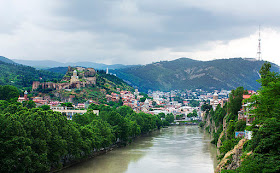
Tbilisi is a fascinating and unique place where East begins to interact with the West. Sitting on the southern side of the Caucasus mountains, Georgia borders Turkey and comes close to Iran and the Middle East. Georgians are renowned for their hospitality and residents of Tbilisi are no different in this respect. Be sure to try the incredible Georgian cuisine. Dishes like Khachapuri and Khinkali are a well kept secret to those not from Georgia - they are wonderfully full of flavor.
Minsk
Minsk is a little known gem. It is the capital of Belarus, a country that sits between Poland, Russia, the Baltic countries and Ukraine. The city is renowned for its incredible Soviet architecture. If Soviet Realism is your thing then Minsk is the place to be.
Photo Courtesy: The photographs in this article are courtesy of wikipedia.org and have been borrowed under the creative commons license. Each photograph has been linked to its host page on wikipedia.
Monday, October 19, 2020
The Green Motorcycle Ride: A Photo Story
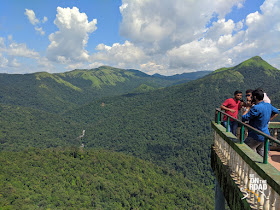
Late August and early September, I embarked on a 10 day monsoon motorcycle ride through the Western Ghats of India. I had gone on a couple of day rides to lesser known Hoysala temples after the lockdown, but this was my first long trip since 22nd March. And boy was I happy!
Monsoons happen to be my favorite season of the year. I love the rains, the freshness in the air, the lush green views, the richness of ecosystem and most important of all, I love getting wet. And what better place to enjoy the monsoons than the Western Ghats.
My 2000 kms motorcycle ride took me to the following places in the Western Ghats of Karnataka over 10 days. There was a lot of walking, trekking, getting wet, eating traditional foods and sleeping to petrichor in between all the motorcycle rides.
1) Sirsi – Yellapur region: Unchalli Falls, Magod Falls, Sathodi Falls, Bilihole Falls, Sonda Vadiraj Mutt
2) Kumta region: Devimane Ghat, Mirjan Fort
3) Karavali coast: Maravanthe Beach, Kota, Kallu Ganapati Temple, Mekkekattu Nandikeshwara Temple
4) Hulikal – Mastikatte region: Hulikal Ghat, Hulikal Falls, Talasi Abbi Falls, Kavaledurga Fort
5) Bisle – Sakleshpur region: Bisle Ghat, Bisle forest view point, Kukke Subramanya temple, Athihally
A few close friends gave me company for the first 4 days, but the remaining 6 days, I rode alone.
I had a ball on this trip and visited some gorgeous places with surreal experiences. This article aims to share my 10 day monsoon motorcycle ride with you as a photo story. Hope you enjoy the greens as much as I enjoyed it.
Above photo: The beautiful view point at Bisle state forest, one of the untouched stretches of forests between Coorg, Malnad and Dakshina Kannada.
Above photo: This was the view that greeted me after climbing up the 5 level Kavaledurga Fort, built in the 9th century by the Nayakas of Keladi. The uphill climb was tough, but the view was totally worth it.
Above photo: Located between Mastikatte and Teerthahalli is Talasi Abbi falls, a hidden tropical beauty in the middle of pristine nature. A short trek makes you sweat just enough to enjoy the water even more.
Above photo: Hulikal falls is a tall waterfall that is located right next to the beautiful Hulikal ghat highway and makes for a fantastic pit stop while riding on this ghat highway.
Above photo: Bisle Ghat is one of the most scenic ghat roads in Karnataka and the best part about it is that there is hardly any heavy vehicular traffic, making for a relaxing monsoon ride where you can be one with mother nature.
Above photo: Mirjan fort is a 16th century fort that is located between Kumta and Gokarna. During the monsoons, moss and other plants take over this fort and change it from a boring brown to a vibrant green colour.
Above photo: Maravanthe beach where the highway, the river and the Arabian Sea all co-exist in one view. It is one of the most famous pit stops for all highway riders.
Above photo: This is how the Devimane ghat looks early in the morning. It is a scenic pit stop on the Sirsi-Kumta ghat highway.
Above photo: One of Karnataka’s wettest places, the Hulikal ghat is a treat to the senses during the rains. It is home to many waterfalls, forests and wildlife.
Above photo: One of Karnataka’s most magnificent waterfalls, the Magod Falls on the river Bedti is a sight to behold during the monsoons. The triple bend on the river, the floating mist and the dense green forests make for a captivating sight.
Above photo: Located between Sirsi and Yellapur is the serene Vadiraj mutt near Sonda. Temples, rustic atmosphere, and oodles of scenery greet you here. This is a Digambar temple near the mutt.
Above photo: This waterfall resembling the trunk of Ganesha is located deep inside the untouched forests of the Kali Tiger Reserve. This is how Bilihole falls looks from the Jajjigudde village. A short trek through plantations and forests bring you to this cliff edge view point.
Above photo: Another monsoon gem, the Aghanashini river plummets 361 feet to form the Unchalli falls. A steep downhill trek and the heavy waterfall spray at the view point make this an amazing monsoon holiday destination.
Above photo: This was my pit stop location on the way back from Unchalli falls where we stopped for a much needed bite as we were all hungry. Don’t you think it is the perfect place to chomp on local snacks while admiring the beauty around?
Above photo: This narrow road is the Bisle ghat highway. Every hundred meters or so, there are mini waterfalls, stream crossings, hairpins, C, curves, S curves and more. And all around you are forests. It is like riding inside a blanket of green. It happens to be one of my favorite ghat roads in India.
Kallu Ganapati Temple: Offbeat Rustic Gem near Udupi

Housed inside a cave of boulders, this temple dates over a thousand years. It enjoys a rustic location surrounded by pristine farmland and nature of the Dakshina Kannada region of Karnataka. I am referring to the Kallu (stone) Ganapati temple, a hidden gem located near Saibrakatte, Udupi district.
During my 10 day monsoon motorcycle ride across the Western Ghats of Karnataka, I happened to reach Kota, the hometown of my friend and popular travel blogger Shrinidhi Hande. It was he, who recommended visiting this offbeat temple and that’s how we planned an evening visit to this temple and the nearby Mekkakattu Nandikeshwara temple.
It was drizzling when we started our respective motorcycles from Kota and the 12 kilometer green route via farms, streams, rivers, paddy fields and villages gave us perfect company. State highways turned into winding village roads and we finally reached this place full of boulders in the middle of absolutely nowhere. A narrow passage (I had to duck n crawl at many places) through the boulders led us to a small shrine with 3 stone idols. The one at the center is Lord Ganesha, while the ones at either side are that of Lord Shiva and goddess Parvati. It is believed that these stone idols and the boulders above it have been created by nature, while the small temple structure was built under the sponsorship of King of Barkuru. There is a small house adjacent to the temple where the priest lives in. Mangalarti ceremony is performed by the priest every morning and evening and these lights add a lot of vibrancy to the otherwise dark interiors of this temple under boulders.
While the temple is fairly simple, the view from the top of it is seriously beautiful. Ancient steps carved on to these boulders lead you to a fairly wide and flat top side of the rocks. From here, you can see a small meandering stream, a road bridge, coconut palms, huge swathes of paddy fields and lots and lots of green cover. This is the kind of place fit for a relaxing picnic or a meditative session. I would definitely recommend visiting this hidden gem of a temple.
To see more photos of this temple, to know more of its history and to know the exact route, read the blog post on this temple by Shrinidhi Hande.
Sunday, October 18, 2020
Travel itinerary if you won the Indian Lottery

Suppose you have just won a giant lottery! The question is how will you spend the money. Traveling can be one of the most exciting things to do. The dream of traveling luxuriously without thinking about money can become real if you happen to win a lottery. There are websites like Sambad Lottery that can give you that opportunity.
You have always dreamt of going to many beautiful places and staying in expensive hotels, but the money problem always stopped you from doing that. The amount of money that you get upon winning a lottery can be enormous. With that much money, you can do anything, and you can go anywhere without worrying about your budget.
Sambad Lottery
There are various online lottery websites to test your luck. By sending very little money, you can get an enormous sum of money in return that you have only dreamed of having. Sambad Lottery is an authentic and very trustworthy website if you are thinking of buying a lottery ticket.
You know what they say that money cannot buy you happiness, but money can buy you things which can make you happy. When you win, the Sambad Lottery is going to make you extremely happy.
After winning a lottery, if you are thinking of spending the money on traveling, then you can plan your dream luxury trip. Here are some of the best ideas for such a trip that that will make you forget reality and that will give you the best experience of your life:
Explore South Africa in the most luxurious way
After winning a dream lottery, you can have a trip of dreams without any problem. You do not want to be stuck in just one place with that much money in your account. Exploring South Africa can be a fantastic experience that you will remember for the rest of your life.
If you are looking for an experience of the colonial era in the most elegant way, then the most luxurious train in the world, Pride of Africa, is the best option. Pride of Africa is a palace on wheels and takes you back in the time of the golden age of rail.
You will have the best traveling experience of your life with some of the best meals too. You will also get to taste some of the finest South African wines. Experience the most exciting safari while having the experience of a royal life.
Adventure trip in a private jet to Antarctica 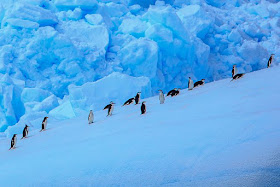
If you are a true adventurer, then you would not miss the chance of traveling to Antarctica. What can be better than a vastly unexplored place and with the minimum number of tourists. No doubt visiting the south pole of Earth will be an exhilarating experience in itself.
You can have an experience of rock climbing and kite skiing. Watching penguins will be one of a kind experience. The breath taking scenery of Antarctica will indeed make you fall in love with this beautiful continent.
If you are not into the adventure type of thing, you can also have a relaxing experience. Science bases are one of the most popular sites to see in Antarctica. A trip to Antarctica will give an escape from reality.
Getting away from the city life to a private island 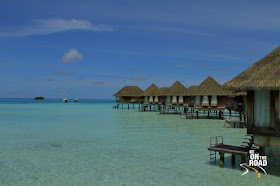
Traveling to a private island can be a very intimidating experience. A trip to a remote island is like going to paradise. As the name suggests, the secluded island is going to be your private paradise.
If you are looking to get away from crowded places, then a holiday to a private island will be the most serene experience. So what if you can not buy a private island, you certainly can have the thrill of living on a remote island.
Many Hollywood stars and millionaires own private islands. So Sambad Lottery is giving you a chance of living like a millionaire or a Hollywood star. Go and buy a lottery ticket from Sambad Lottery and have the best experience of your life.
Staying in a 7-star hotel in Dubai 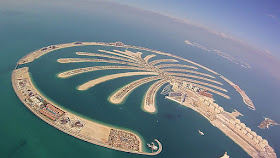
When you win a lottery that you have always dreamt of winning; then, you might like to spend the money a lot lavishly. Staying in a 5-star hotel is a great way to spend your money, but when you have just won the lottery of your dreams, then you would want more than a 5-star hotel.
The first-ever 7-star hotel is Burj Al Arab Jumeirah and that is in Dubai. Burj Al Arab Jumeirah indeed lives up to its 7-star standard. You will have your private lift, cinema hall, and a library. The best thing about this hotel is its royal suite.
If you have always dreamt of having a private villa as well; then, this hotel has a private villa for you too. Burj Al Arab Jumeirah is more than just a hotel. It is your dreams coming into reality.
If you have just won a lottery, then where would you go and spend your money. There are many other ways to spend the money you just won. But traveling will give you a much richer experience. You will have the opportunity to explore the world and the different cultures of it.
There is no harm in buying a lottery ticket worth some hundred bucks and getting the opportunity to travel the world. So what are you thinking of? Go and try your luck, and you never know where life can take you. If you do not take chances in your life, then you'll regret it.
Note: Please use your own discretion before buying a lottery ticket.